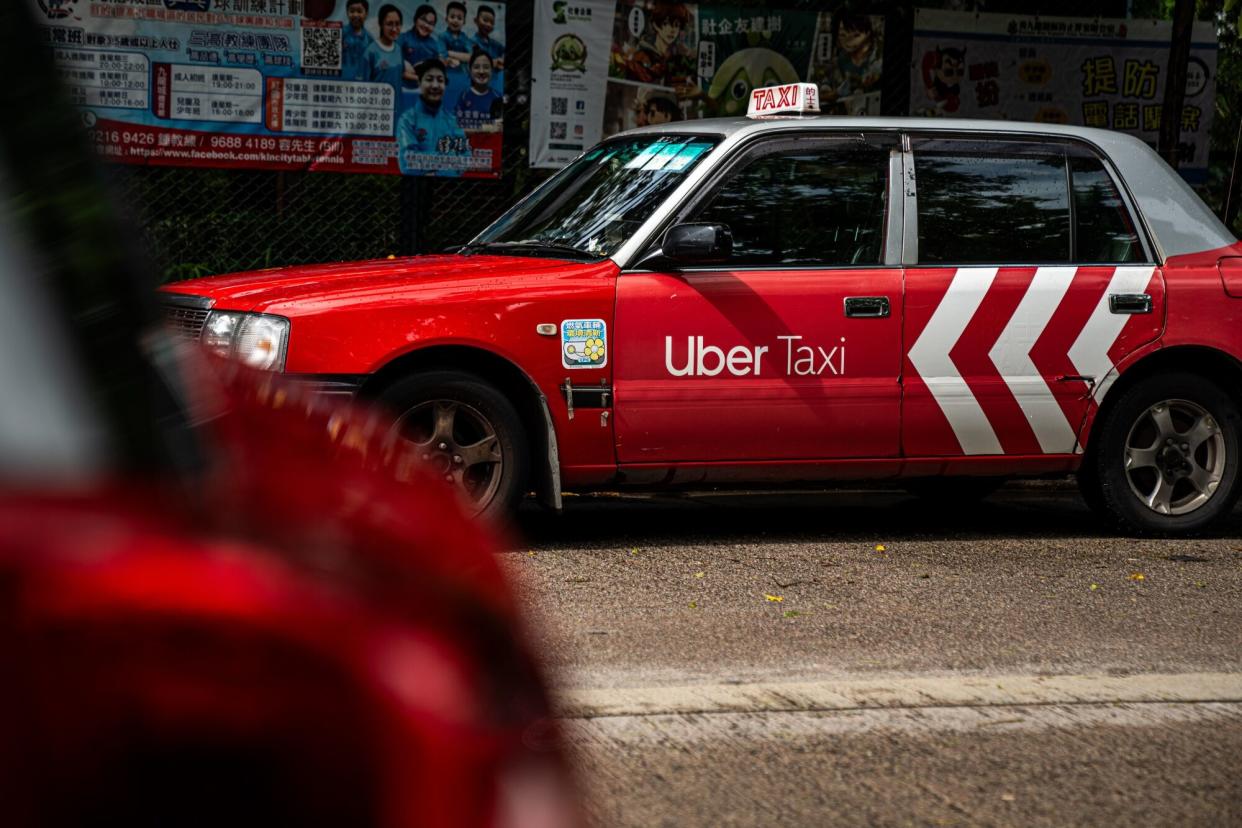Hong Kong Unveils Plan to Regulate Uber Decade After Launch

(Bloomberg) -- Hong Kong outlined long-anticipated but vague plans to regulate ride-hailing services, creating uncertainty over Uber Technologies Inc. operations in a city infamous for the poor quality of local taxi services.
Most Read from Bloomberg
Saudis Warned G-7 Over Russia Seizures With Debt Sale Threat
Microsoft Orders China Staff to Use iPhones for Work and Drop Android
S&P 500 Holds Gains as Fed Bets Steady on Powell: Markets Wrap
Authorities intend to license platforms such as Uber and adopt tougher penalties for rule breaking, the Transport and Logistics Bureau said in a paper published on Monday. Taxi services would be improved through the introduction of so-called premium fleets, it said.
At the heart of the issue is the number of hire-car permits available for ride-hailing services. Currently there are only 1,500. Uber, which launched in Hong Kong a decade ago and has been unregulated since, has more than 10,000 drivers in the city.
The proposal lacks clarity, said Oliver Chan, assistant professor at the Chinese University of Hong Kong. If authorities don’t increase the quotas for hire-car permits, many Uber drivers would still be operating illegally, he said.
Officials said they have no plans to increase the quota, the South China Morning Post reported.
“It’s still very uncertain,” Chan said. “What we know right now is that they wanted to improve the taxi service quality first, and then to also see how the regulation — which is uncertain at this point — of the ride-hailing platform could also contribute.”
Uber said it welcomed the government’s plan to regulate ride-hailing platforms, adding it is “critical” for the government to also come up with a workable licensing regime. Any move to cap the number of ridesharing licenses in the city would deal a blow to the many drivers who rely on the platform for flexible earnings opportunities, a company spokesman said.
Losing Money
Uber has long drawn the ire of Hong Kong’s taxi license owners, who have seen the value of their licenses go down. A taxi license is now worth HK$2.8 million ($358,000), down from about HK$7.3 million back in 2015. Authorities have barely sold any new licenses for 30 years, despite the population rising by about 1.5 million people, or 25%. There are some 18,000 taxis in circulation.
Earlier this year, some disgruntled taxi drivers posed as Uber passengers in order to report them to the police. That prompted the city’s leader John Lee to warn people against conducting undercover operations.
Complaints about rude service, overcharging and dangerous driving have long dogged Hong Kong’s taxi trade, further putting pressure on the government to regulate ride-hailing while also introducing reforms to improve taxis. Complaints against taxis lodged with the government last year rose 75% compared with 2022, while the number of traffic accidents involving taxis increased by 26%.
While the proposal is unclear, it leaves the door open for ride-hailing platforms to continue to co-exist with taxis in “somewhat of a gray area,” said lawmaker Gary Zhang, an engineer who formerly worked as an operations manager at subway operator MTR Corp.
“Compared with some of the rumors or previous signals about what the government was preparing to do, this reflects quite a big adjustment,” he said.
Study Plan
The Transport Department will conduct a study on commuter needs to help shape the new planned regulatory regime, according to Monday’s paper. The study should be completed within 12 months, it said. Lawmakers will discuss the regulatory framework on Friday in a panel meeting.
Uber has in years past clashed with regulators around the world, as its phenomenal growth applies pressure on traditional taxi and transport businesses. While Hong Kong is a fairly small market for the San Francisco ride-hailing leader, the outcome of the dispute may help shape a framework for regulating the company elsewhere.
The company has already shielded itself against potentially tough regulation of ride-hailing services through its 2021 acquisition of local taxi-hire app HKTaxi. Users of the Uber app also have the option to book metered taxis, which the company said in October includes more than 10,000 taxi drivers. Uber shuttered its Uber Eats service in Hong Kong in 2021.
Yet, to Zhang, it’s not possible for the city to put the Uber genie back in the bottle.
“Taxis in Hong Kong are truly not able to meet the capacity and needs of the public,” he said. “If overnight, Uber was wiped out from Hong Kong, that would have such a huge impact on the city.”
--With assistance from Edwin Chan.
(Updates to add quotes from fourth paragraph, add details about Uber Taxi in the third last paragraph)
Most Read from Bloomberg Businessweek
At SpaceX, Elon Musk’s Own Brand of Cancel Culture Is Thriving
How Stocks Became the Game That Record Numbers of Americans Are Playing
©2024 Bloomberg L.P.



